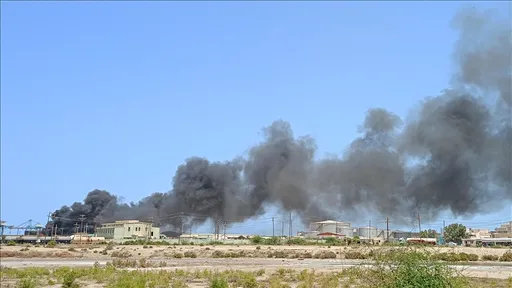When civil war broke out in Sudan last Ramadan, 55-year-old Hanadi Ali had hoped that the power struggle between army chief Abdel Fattah al Burhan and the head of the paramilitary RSF Mohamed Hamdan Dagalo would end swiftly.
But the hopes of the Khartoum native were short-lived.
Almost a year later, the war continues to rage, uprooting an estimated 6.5 million people from their homes in the vulnerable North African country and sparking what the UN calls the world’s largest internal displacement crisis. The exodus added to the three million already displaced before the fighting began on April 15, 2023.
Another 1.8 million people have been forced to flee abroad — including to Chad, South Sudan and Egypt. Among these people are Hanadi and her family, who are now living in a foreign neighbourhood somewhere in Cairo.
In a briefing to the UN Security Council on the humanitarian situation in Sudan, Edem Wosornu, director of operations and advocacy in the Office for the Coordination of Humanitarian Affairs (OCHA), said “the harrowing levels of violence in this conflict have taken a horrendous toll on civilians” and that based on reports, the state of affairs “is truly the stuff of nightmares”.
“We are here today to warn you of a far-reaching and fast-deteriorating situation of food insecurity in Sudan – a situation driven by 11 months of brutal and unremitting conflict,” Wosornu said on March 20.
“There are reports of mass graves, gang rapes, shockingly indiscriminate attacks in densely populated areas and many more horrors,” she added, noting that “the High Commissioner for Human Rights has warned that at least some of these acts of horror may amount to war crimes.”
Forced to flee
News of these atrocities began swirling not long after the war began, so Hanadi sent her four young daughters away from the fighting in Khartoum to live in an area deemed safer — Kassala state’s New Halfa, located more than 300 kilometres east of the country’s capital.
Hanadi and her husband are parents to six daughters, who were raised in Saudi Arabia where they lived for 22 years. Two of their daughters live abroad, including Hanadi’s oldest, who has been supporting them financially and paid for their travels to Egypt.
She says this would have been their sixth year back in Khartoum since returning to Sudan for her children’s tertiary education.
“The oldest with me was studying radiation at Sudan University and the second one studies medicine. The third is in high school, and my youngest is in sixth grade,” adds Hanadi, who used to run a mini-market in her hometown Khartoum before the war.
“They wanted to come study in Egypt because they wasted a year in Sudan.”
Days after Eid-ul-Fitr, on April 28, Hanadi left Khartoum and first fled to Gedaref, a state in East Sudan.
She reunited with her four daughters after the family decided to settle more permanently in Gedaref, a part of the country many residents of Khartoum and elsewhere had also taken refuge.
Eight months in, news trickled in about the arrival of RSF fighters in December in the city of Madani, less than 240 kilometres west of Gederef. Health hazards like dengue fever were already on the rise, while rumours about the possibility of the RSF targeting Gederef next were spreading, Hanadi tells TRTWorld.
This prompted the family once again to look for safer shores, but this time across the country’s borders.
On January 5, Hanadi and her four daughters, together with Hanadi’s sister and her four sons, began a gruelling journey of more than 2,500 kilometres by road through the Asyuit desert. It would take them over 40 hours to reach Cairo.
‘The hell of war’
Hanadi says their driver and guide were one Ali (surname withheld for safety reasons) and his cousin, who took turns driving the pick-up truck across the border.
That was the last time she saw her husband in person, when he said farewell to his family. Unable to join them, he stayed behind in Sudan.
At 10 pm, after hours on the road, the group reached River Nile State’s Atbara city, situated in northeastern Sudan, where Hanadi says they spent the night sleeping in a big tent on a large rug they had packed for the journey. “It was a very isolated area, you could only see tents and structures for bathrooms,” she states about the vicinity.
At this point, Hanadi paid Mesud, the driver, his fee, which she says amounted to 250,000 Sudanese Pounds (SDG) per person (approximately $425).
“I had to pay for five people, so I paid around 1,250,000 SDG (approximately $2,130). Do you see how much money we had to pay just to go to Egypt and run away from the hell of war?,” Hanadi laments.
Intense fighting has also caused Sudan's education system to collapse, with many schools shut down or repurposed to host displaced people. Most national end-of-year exams were reportedly cancelled in 2023 too. According to Hanadi, “Our children insisted that we go, because they didn’t want to waste more time without their education.”
Road to Egypt
In the morning, after offering bread and coffee, Mesud told Hanadi that another family of five would be travelling with their group, and left to go get them in the middle of breakfast.
“We found out that the family was going to sit inside the truck because they paid more – 300,000 SDG (nearly $500) per person — and so we sat at the back of the truck.
There were eleven of them cramped at the back, Hanadi notes, while four others sat inside the double-cabin truck with the driver. “They made us sit at the edges of the truck with our feet dangling out the sides," she says, recounting the experience.
“The boys were sitting on one side, the girls on the other. My sister was in the middle with her back to the truck cabin. Two of my daughters were also in the middle,” she adds.
The trip was not pleasant, partly because the vehicle they were riding in was moving at high speeds. Hanadi and her family braced harsh winds and cold, early-winter weather, in addition to having “to focus on not falling” off the truck.
“My daughters were screaming uncontrollably. They were raised in Saudi Arabia, so they are not used to such hardship.”
The precarious passage continued until nightfall when they reached the Egypt border, an area known for bandits who used to fire at passing vehicles.
Even as Mesud was telling them about the bandit gangs, Hanadi heard a sound which she says sounded like a bullet being fired.
“Something hit my leg, at the back of my ankle,” an alarmed Hanadi announced to the group travelling with her. “It felt like a strong hit, and I bled a lot.”
No one was sure what it was, and Mesud said it could even have been a loose pebble that became a projectile from under the vehicle’s wheels.
Her sister carefully used perfume to disinfect the wound, and tightly wrapped a cloth around her leg, before they finally stopped at an area with two huge tents for the night.
New shores
At around seven or eight o’clock the following morning, they were drinking tea when, Hanadi says, another member of Mesud’s family arrived in a car with an Egyptian licence plate number, for their next transfer to the border checkpoint.
“He drove a lot faster than Mesud. He told us he had to drive fast because there were a lot of bandits in the area.
“The car was swerving in the sand, and the wind was still strong. They told us to be quiet because of the bandits. We reached the border checkpoint at around 11 or 11:30 am, and they welcomed us, saying ‘Ahlam Wsahlan’,” she adds.
One Egyptian person led the family inside a cabin, while another took money from the driver, according to Hanadi, adding that they also tried to sell the family bus tickets at inflated prices. “We didn’t accept. We told him we knew the bus ticket was 400 Egyptian Pounds (EGP), not 1,000 pounds EGP. We refused to pay extra.”
Hanadi and her family eventually found themselves at a bus station in Aswan on January 7. Two rickshaws picked them up and brought them to a big mosque nearby that had bathrooms where they showered and changed clothes. “We found out this was all pre-planned by the smugglers,” Hanadi says.
“Some people get driven to private apartments to clean up, but we’ve heard that in these private apartments, sometimes you might get robbed,” she explains. “So they told us, if the smugglers are honest, they will take you to this mosque.”
Life in Cairo
She relays another uncomfortable experience about the rickshaw drivers who had initially agreed to take them for a set fee, but tried to haggle for a higher fare after noticing the family had cash. They ended up paying the bus driver extra, too. “That’s the way it is, I guess, you always have to pay extra.”
From there they boarded a bus to Cairo, where they finally got to rest for a few days upon reaching on January 8. “We went to the UNHCR office… for our UN cards. After that, we finally settled and got our refugee cards.”
Hanadi and her daughters now live in a small rented apartment in an area called Badr. Her sister’s eldest son, who was already in Egypt and studies at Al Azhar University, helped them in settling down.
Life in Cairo is more expensive compared to Sudan, Hanadi says. “I don’t know, perhaps because of the high price, life here is a little more harsh than where I’m from … We can see that even Egyptians are struggling with these prices,” she adds, and notes that whatever fears she had about how they would be perceived in the country quickly went away.
Hanadi says, “We found the Egyptian people understanding and aware of the situation in Sudan. May God bless them with safety.”























